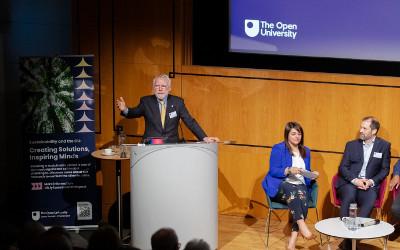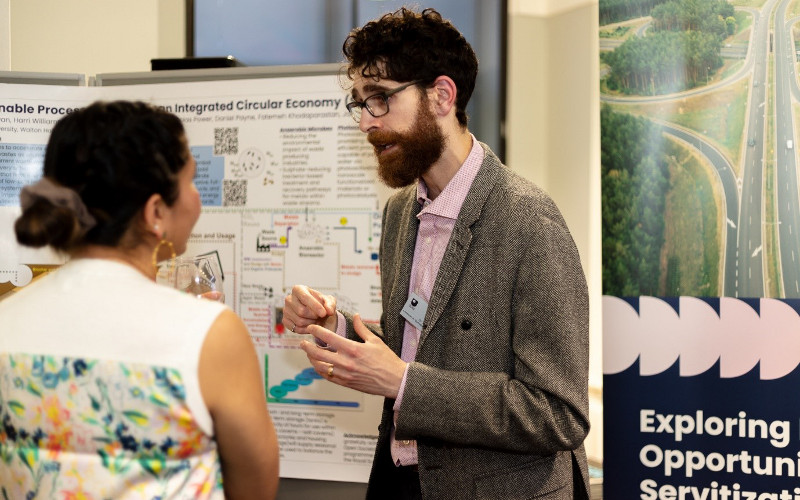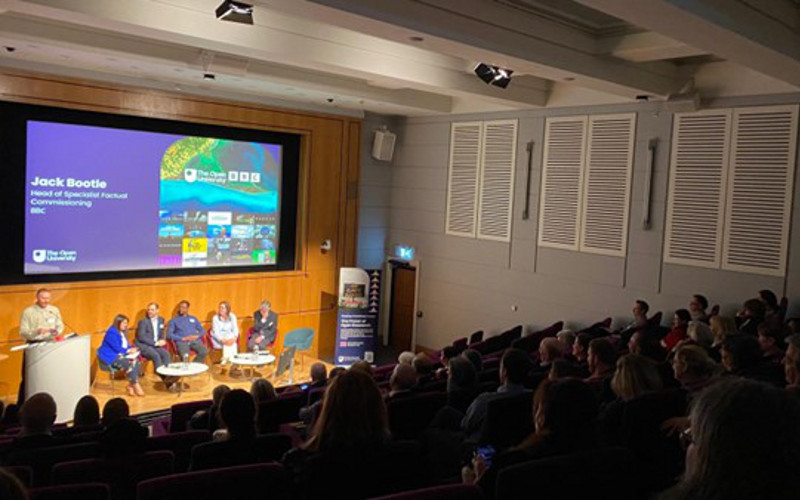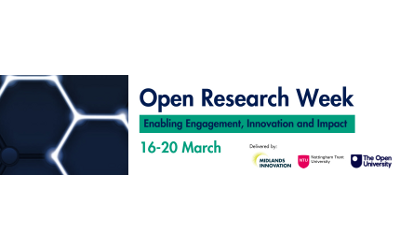Shaping a sustainable future – the power of Open Research

“Creating Solutions, Inspiring Minds”, that is how The Open University (OU) is tackling climate change through open research according to Professor Nick Braithwaite.
On Thursday 18 April, The Open University hosted an event at the Wellcome Collection to showcase the University’s teaching and research in sustainability.
The exhibition space and auditorium felt alive with the buzz of people discussing and finding out about OU research and how this has informed BBC/OU coproductions, including landmark documentaries on the natural world.
The exhibition featured some of the OU’s research projects, many of which form part of the University’s Open Societal Challenges programme, which focuses on multidisciplinary, challenge and mission-focused research.
Academics conversed with interested delegates on a range of topics such as sustainable processes linked for an integrated circular economy, connecting communities and heritage against climate crisis, Butterfly wing diversification and evolution with citizen science, and catalysing transformative food futures for global sustainability. All of which are essential for a sustainable future.

This research forms part of the University research strategy which has a focus on sustainability as one of three main ‘open research’ themes.
Following the lively discussion in the exhibition, the main auditorium felt intimate, yet brimming with knowledge, as Professor Nick Braithwaite, Executive Sponsor for Sustainability, took to the stage to make his opening remarks.
“This event reflects our recognition that the challenges posed by climate change and net loss of biodiversity call for interdisciplinary, multi-perspective collaborations. The OU was, and still is, a disruptive innovator, founded on a social justice mission and we’re comfortable now with extending that concept into environmental and social justice. We’re responding to the climate and nature crises through applying our learning to the protection of people’s rights, to the robust influencing of policy-makers, to the safeguarding of food supply chains, and to improving living conditions now and for future generations worldwide.
“The OU works at scale and with significant reach – we have around 208,000, registered students and our alumni community of over half a million. Our free online learning community exceeds 10 million. And we are committed to aligning our heritage of disruptive innovation with opportunities to create a regenerative future.”
Chaired by Jhumar Johnson, Chief of Staff to the OU Vice-Chancellor, the panel of five experts was formed of OU academic consultants Dr Yoseph Araya, Dr Mandy Dyson, Dr James Warren and Dr Philip Wheeler, and Jack Bootle from the BBC. The panel discussion covered the commissioning of sustainability related OU/BBC coproductions, the tips and tricks that commissioners use to interest people in such series, the role of the academic consultants, and the important messages about our natural world and the needed efforts to innovate, restore and regenerate for a more sustainable future.
The discussions featured clips from some of the landmark programmes such as Wild Isles, Frozen Planet, Blue Planet II and What they really mean for you, which acted as a jumping off point for academics to tell us about the importance of these habitats and technologies. The discussion was followed by a Q&A session which featured thought provoking questions from the audience.
“There is a lot wrong in the world, but things can be done. These don’t need to be huge things, but they need to be done by all of us. We need people with vision and perseverance and that’s something everyone can play a part in." commented Dr Yoseph Araya, Senior Lecturer in Earth, Environment and Ecosystems and academic consultant.
Restoring nature
It is no secret that nature has been depleted and we need to restore these natural habitats and ecosystems to ensure both their safety and ours. As Dr Philip Wheeler, Senior Lecturer in Ecology, put it “People need trees, our towns and cities are now more wooded than our countryside. It is important to consider the individual relationships that people have with nature.”
Changing behaviours
To achieve these changes, we need to change behaviours. Dr James Warren, Associate Dean, Student Experience, was the academic consultant for What they mean for you, which focussed on electric vehicles. Dr Warren said, “A lot of the change is about how we treat net zero – with respect to how we regulate around it. It is also about the speed with which we try to do these things as the timeline is quite short to get these things done. We are also facing challenges at a national level around lack of investment and infrastructure, but we also need to influence human behaviour. Heat pumps and insulation are not exciting topics, but they are crucial solutions to some of our problems.”
Dr Mandy Dyson, Senior Lecturer in Biology and academic consultant, added, “If people can change their attitude towards problems, instead of getting frustrated and letting those problems get worse, we can work together to find solutions. When people saw the footage in Blue Planet II of albatrosses consuming plastic, there were huge movements to give up plastic straws. When we can see the destruction caused, and it doesn’t inconvenience us too much, we can easily make changes.”
The OU/BBC relationship
The OU’s relationship with the BBC goes back to 1971, when OU lectures were screened late night on the BBC. And that relationship has stood the test of time and blossomed, with the OU and BBC sharing over 30 co-production projects across TV and digital channels each year. These programmes, radio shows, and other informal learning align to both institutions’ mutual interests and dedication to creating and sharing knowledge and learning to realise social and environmental justice.
Jack Bootle, Head of Specialist Factual commissioning believes it is important to integrate environmental content into existing content, “Natural history programmes did not used to mention biodiversity loss, climate change, etc. but these are important issues that affect our world. Both the OU and the BBC aim to present this information in a different and accessible way for mass informal education.”
Creating solutions, inspiring minds
The event closed with a poignant statement speech from Professor Braithwaite, who solidified the University’s commitment to championing climate and nature in the creation and sharing of knowledge. “The world has fallen short of its target to limit global temperature increase to 1.5 degrees above pre-industrial levels, and we now face the consequences: climate volatility, rising sea levels, coastal erosion, and highly pressurised ecosystems. Net Zero Goals are being viewed as ‘out of reach’ on current plans. Confronted with this shocking reality, we must explore radically different ways of living: educating and empowering people to be positive forces for regeneration, and to prioritise regenerative practices in our homes, businesses, and nations. This must be our immediate focus. All of us here tonight have a stake in this.”

Challenge Us!
The Open Societal Challenges programme enables those outside the OU to connect with researchers on society’s most pressing issues. The University is looking for exciting research ideas tackling real-world problems under our themes of Sustainability, Living Well and Tackling Inequalities. For the next phase of the programme the OU has invited Milton Keynes based businesses and UK charities to pose an open societal challenge topic for the OU to work on via the Challenge Us! competition (closes 15 May 2024).
Contact our news team
For all out of hours enquiries, please telephone +44 (0)7901 515891
Contact detailsNews & articles

Open Research Week to spotlight innovation in 2026
Open Research Week will return from 16–20 March 2026, uniting Open University researchers and partners to explore how open practices drive engagement, innovation and societal benefit.